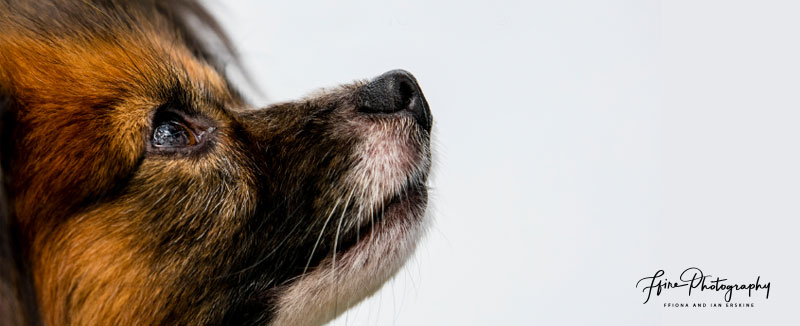
BREEDING OF DOGS
Breeding of dogs is the purposeful bringing together of a male and female dog, with the intention to have puppies preserving the breed. The breeding of dogs has inherited a negative reputation in recent years due to irresponsible breeders, puppy farms and the illegal puppy trade. However, responsible dog breeders care passionately and professionally for their breed and the puppies they have bred, and they are happy to give all the time, money and care that are required to breed dogs responsibly for a happy and healthy life.
Professional, responsible breeding demands complex knowledge. Breeders should understand the biology and reproduction of dogs and the breed(s) they keep. They need to know how to keep, breed, and raise dogs to guarantee their health and welfare. Nutrition, biological and behavioural development, and regular health checks play a vital role in this.
Breeding is not just giving birth to a litter of puppies it also means carefully selecting the two dogs for mating. And to make such a responsible decision also takes expertise.
WHAT IS A NATIONAL CANINE ORGANISATION (NCO)?
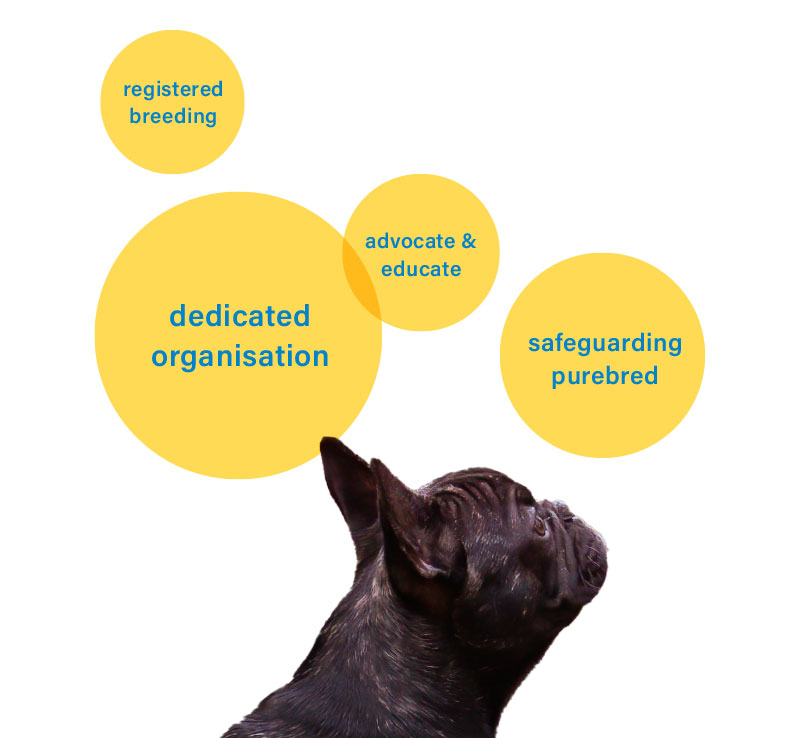
A national canine organisation (NCO) is a dedicated organisation that covers all activities related to registered breeding in a country. An NCO regulates breeding requirements, runs the studbook, and issues pedigrees. They advocate and educate about the professional breeding of purebred dogs. They also organise other dog-related activities, such as dog shows, dog sport events, trials, and so on. Furthermore, they strive to promote and raise awareness of responsible dog ownership,
care, and welfare, aspiring to be the most effective advocates for purebred dogs in their countries whilst safeguarding the pureness of the purebred genetic pool.
Many national NCOs are members of the FCI (Fédération Cynologique Internationale), which is the largest, leading international organisation, for all things related to pedigree dogs. With the range of activities catering to all interests, NCOs are the dog club for all dog lovers.
HISTORY OF BREEDING OF DOGS
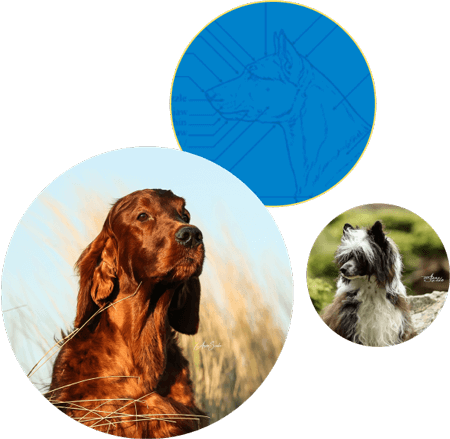
The FCI recognises over 350 breeds of dogs globally. Many of them have historical origins dating back hundreds and thousands of years. Dogs have been alongside humans performing various tasks for thousands of years, which is one of the reasons they have been such a successful and respected species. Humans have selectively bred dogs throughout the history of domestication to produce dogs with specific characteristics, for example, to assist with hunting, herding, and guarding. Humans worked out that if dogs could be bred for specific traits, their offspring would also have these traits, which would further aid the survival of humans.
Selective breeding is the procedure of breeding purposefully selected dogs, with the idea to produce and preserve certain physical and behavioural characteristics, health conditions, skills, and aptitudes to be able to perform unique tasks. This breeding of dogs to enforce a skill unique to that breed has been used for centuries to help society, such as police dogs, rescue dogs, sniffer dogs, dogs for the disabled, guide dogs for the blind, etc. Breeding and forming dog breeds were not a random act but a well-planned and thought-out activity.
Fast forward hundreds of years, and the wonderful dog breeds we see at dog shows or dog events today, have not happened by accident. Each breed has taken years of planning and loving work of dedicated breeders that has continued through the ages.
Due to the technical development and change of lifestyle, some of the functions of dogs have been replaced with technology, which is why many breeds face extinction, with some having ceased to exist. Breeders who breed to preserve dog breeds are usually hobbyists with a thorough knowledge of breeding.
WHAT IS BREEDING DOGS ACTUALLY ABOUT?
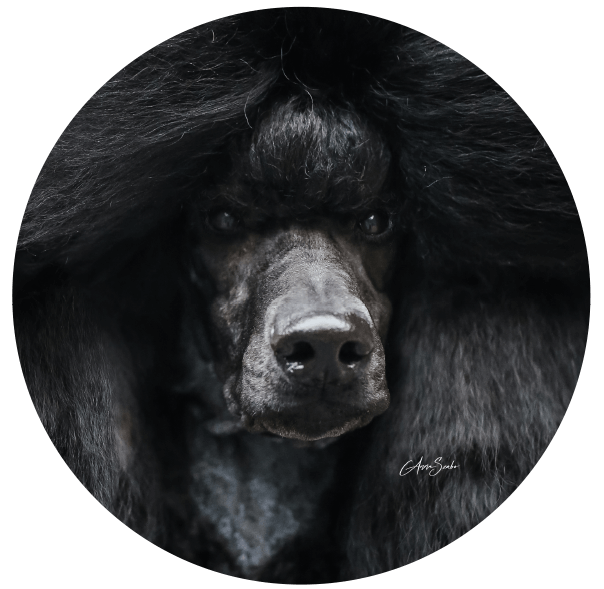
Dog breeding to responsible breeders is about passion, expertise, and commitment. The core of the activity is to preserve and maintain the breed for further generations via selection. It is not something taken lightly or done on a whim but is a labour of love for their chosen breed. It requires solemn commitment and responsibility because it involves bringing living beings into this world, who will go on to have an impact on the lives of the families they go to become part of. Part art and part science. It can be very time consuming, expensive, and in some instances, heart-breaking and should never be viewed as a source of income. Responsible breeders will invest their time to ensure that they produce healthy and sound puppies through the correct matching of parent dogs, carrying out genetic tests where relevant, and providing the right environment for the puppies so that they are properly cared for and socialised.
Why & who should breed?
The purpose of a responsible breeder must be the preservation and improvement of the breed with safeguarding dog health and welfare, which demands knowledge.
Knowing the FCI breed standard (blueprint) of their chosen breed, understanding how to identify and address genetically inherited disorders and health issues, spending time and gaining experience via observation are all vital. Without in-depth study, years of experience in their chosen breed, or without the close guidance of a mentor, it is impossible to know or envision the end goal when it comes to breeding. Which is why it should be very carefully considered and thought out beforehand.
WHY CHOOSE AN NCO REGISTERED BREEDER?
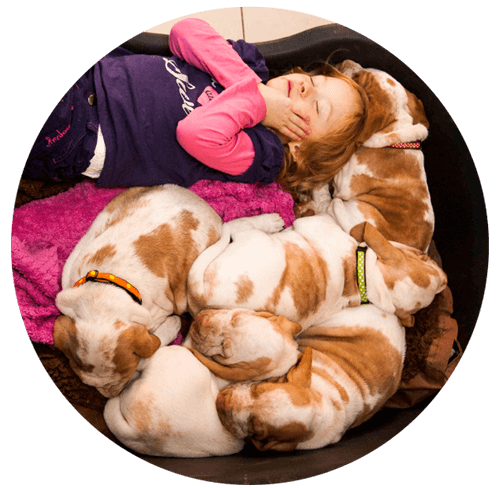
It is essential to distinguish between two types of breeders: Responsible Breeders and Unscrupulous Breeders. Responsible Breeders are the type of breeders you should be looking for in your quest to buy a puppy. Their reason for breeding a litter of puppies is motivated by the improvement, preservation, and promotion of a breed. Unscrupulous breeders only see breeding as a source of income. Due to the pure financial motivation, they ignore the needs of dogs which leads to numerous welfare and behavioural issues in the future. That is not to say that Responsible Breeders do not charge for their puppies to cover the costs of raising a litter, but it is not solely for profit or to make a living.
A Responsible Breeder does not just want to sell a puppy but also wants to make sure the future welfare of dogs coming from their kennel is guaranteed. They want to make sure that they go to loving homes where the new owners are aware of and understand the unique features, temperament, and nature of that breed. Besides love, new owners should be able to provide a suitable environment for the puppies to grow up and live in.
This often means Responsible Breeders will vet prospective new owners and may have a longer list of questions for them than they have for the breeder. It also usually means that the new owner may have to wait for a puppy, as a Responsible Breeder tends to breed a limited number of litters in a year. A Responsible Breeder will also have in-depth knowledge of the breed and will be happy to answer any questions and help provide the new owner with resources in their research for the breed.
Responsible Breeders will encourage the new owner to meet the puppies together with their mother and possibly with the other dogs in the household.
This situation is perfect for observing the interaction of the puppies and gives an idea of what a full-grown adult dog looks like, behaves like and the care that will be required for a decade or more. The new owner will also have an idea of the environment in which the puppy was brought up in and the health status of the mother dog.
Responsible Breeders will provide new owners with information about the characteristics and the unique needs of the breed. They will also give advice about how to take care of the puppy, providing information on nutrition, a vaccination card, microchip details, health test results (where relevant), a pedigree certificate (where relevant) and will be open to give the new owner further support if it is needed for the lifetime of the puppy. A Responsible Breeder will NEVER sell a dog online without having met the new owner in person to ensure they will provide a suitable home for the puppy.
Responsible Breeders will also have contracts of sale. They will clearly instruct and insist that if the new owner is unable to take care of the puppy anymore for whatever reason, they will take the puppy back, either to keep the puppy or to rehome the puppy.
Furthermore, Responsible Breeders will conduct available genetic or other health tests and regular veterinarian checks on the parents of the puppies to ensure that any potential genetic diseases or conditions will not be passed on. In the case of NCO breeders, such health tests and screenings are a regulated requirement by the breed club or the NCO. They will be able to provide certain health guarantees depending on the nature of the potential illness or disease.
They will also want to be informed if the puppy ever suffers from any illness or unwanted health condition. It is vital to know that dog health is a complex topic and having health screenings done is just one part of the story. Besides the steps taken by a Responsible Breeder, the new owner will also need to ensure the correct care of the puppy.
NCO breeders only sell puppies with certified pedigrees. A certified pedigree is the dog’s birth certificate. Dogs with a certified pedigree are identifiable as they are either microchipped or tattooed. Besides the information it gives on your dog, it also shows the ancestries. Most importantly, it certifies your dog is purebred. A certified pedigree is proof of the generations of work that responsible breeders put into preserving the breed. Based on its nature, any health or genetic test they have carried out will also be listed on the certified pedigree of the puppies. The pedigree may also help to prove the ownership of a dog depending on a country’s national legislation and could be used to track a dog or provide proof of ownership in a legal case.
IN SUMMARY
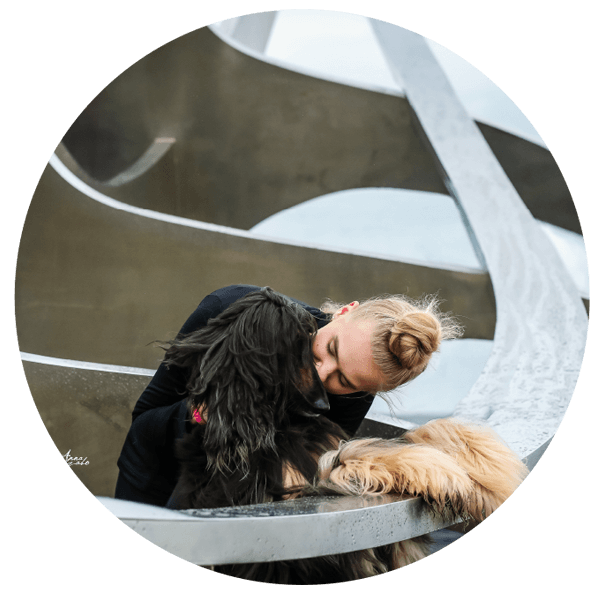
These are some reasons why you should choose an NCO breeder:
- They have a genuine interest in and dedication to the breed, including health, welfare, and preservation of the breed for future generations.
- They have the knowledge and breed expertise, having been involved in the breed for a reasonable length of time and have proven their commitment.
- They have studied the Breed Standards and breed strictly according to them to preserve and improve the breed, so they plan every litter carefully and have a good reason for each litter.
- They will ensure the welfare of the dogs that are bred from. These dogs may be their family pets as well.
- They are not profit driven and do not take short cuts or compromise on providing the best care for the pups they raise. This cover proper nutrition, socialising, regular vet checks, vaccinations, and deworming.
- They take great care in raising the litter of puppies to be healthy, mentally sound, and well socialised examples of the breed.
- They will vet new owners to ensure they are well suited and the best fit for a puppy and the breed. The future welfare of the puppy is their utmost concern.
- They advise you whether the breed fits into your lifestyle, what special knowledge or care will be necessary to raise and keep your dog.
- They will keep in touch with you and assist you when necessary, after your new dog arrives in its new home.
REGISTRATION OF PUPPIES & CERTIFIED PEDIGREES
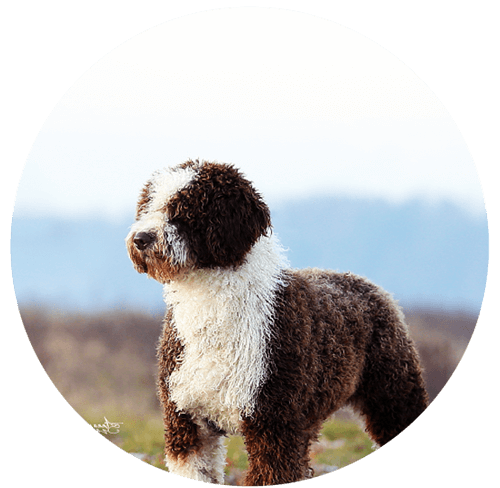
All NCO breeders will register their puppies with their NCO. If the NCO is affiliated with the FCI, then the pedigree is accepted by all other NCOs which are members or contract partners of the FCI.
What is a certified pedigree?
A Certified Pedigree is your dog’s birth certificate containing the family tree showing the dogs ancestors. Most importantly, it certifies your dog is purebred.
It contains the following information
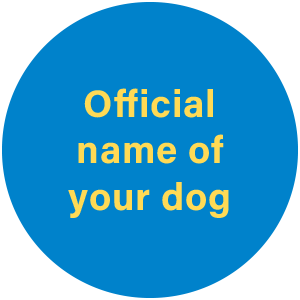
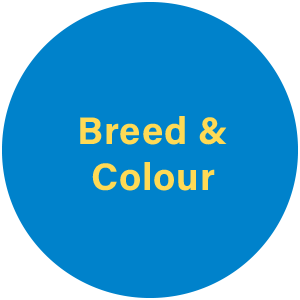

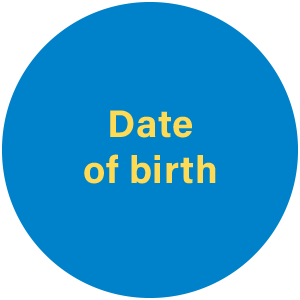

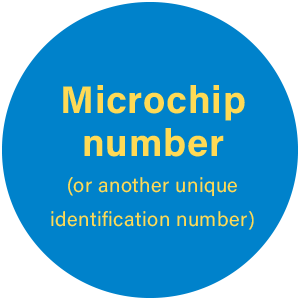
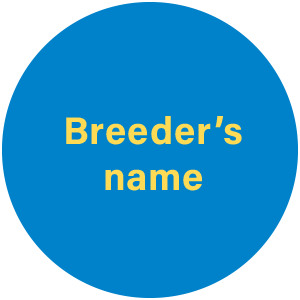
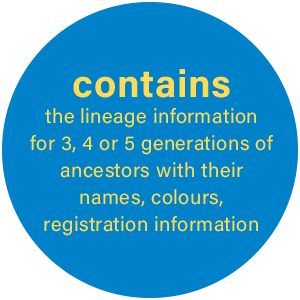
All pedigree certificates have the official stamp of the issuing NCO. If it is a member or a contract partner of the FCI, the pedigree also contains the FCI logo. The FCI has only one recognised pedigree dog registry (officially named studbook) per country.
The pedigree certificate may also show further information, such as health test or DNA test results, results of trials, dog show titles. It depends on the administrative regulations of the NCO or the breed club as to the details shown on the certificate. All the titles and awards a dog earns at recognised events also become part of its pedigree certificate for example when a dog wins a championship title, it will have it permanently noted in its pedigree.
Any buyer of an offspring of a champion dog will know it by looking at the pedigree. A close look at the ancestors’ names on the pedigree for the abbreviation “CH” indicates how many champions have made up the genetics of this dog.
With dog breeding, it can also give some assurance that the future offspring of the dog, if mated well, will carry on those desirable traits. Other championships related to dog sports and trials like Field and Obedience also have their abbreviation and are noted on the pedigree.
The pedigree certificate is not a health certificate! It is a record and proof of lineage and the dog’s identity, not a record of health. A vaccination certificate is the official proof of your dog’s vaccinations.
A Certified Pedigree is your dog’s birth certificate containing the family tree showing the dogs ancestors. Most importantly, it certifies your dog is purebred.
It contains the following information
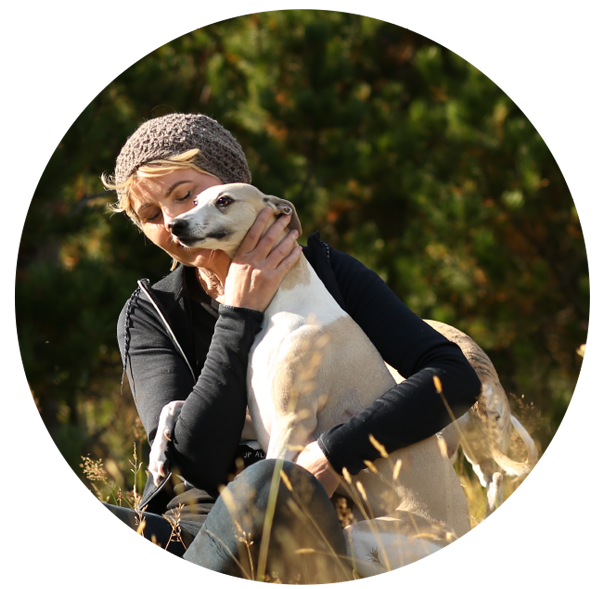
How to find an NCO Breeder
Many NCOs also have Breed Clubs with their specific functions and activities, dedicated and specialised for a particular breed or a group of breeds. Both these organisations are great sources of help and information in your quest to find out more about your chosen breed and where to find a Responsible Breeder. Breed Clubs also run events you can attend to learn more about the breed. It is also an opportunity to meet other owners and breeders and acquire more knowledge from a variety of people. Ask for a list of breeders from either of these organisations, which should be the first step in finding a Responsible Breeder. You still can do your own research to find the right breeder to buy your puppy from, based on the advice given above.
ADDITIONAL RESOURCES
Breeding systems and dog health and welfare
Position of the FCI Scientific Commission
This paper is dedicated to the memory of our colleague Ana Eugenia Vázquez Liévano, a great person, a friend whose invaluable contributions, vision, and dedication have been instrumental for the work of this commission.
Please click to view PDF
Use of genomic tools
Position of the FCI
Over the last 25 years, the field of genomic has revolutionised dog breeding, offering to dog owners, breeders and organisations a multiplicity of tools to breed and monitor their animals. This document presents the position of the FCI regarding the potential and limits of genomic tools for a sustainable management of dog breeds
Please click to view PDF


